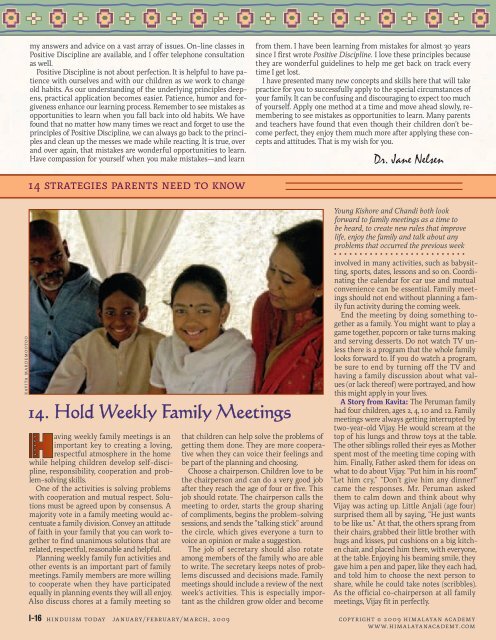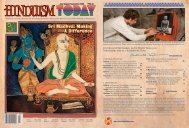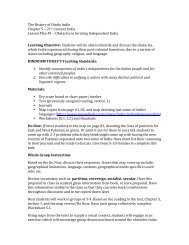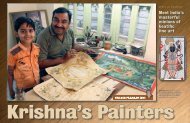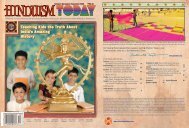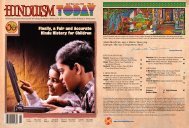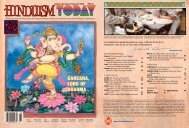Hinduism Today January 2009 - Cover, Index, Front Articles
Hinduism Today January 2009 - Cover, Index, Front Articles
Hinduism Today January 2009 - Cover, Index, Front Articles
You also want an ePaper? Increase the reach of your titles
YUMPU automatically turns print PDFs into web optimized ePapers that Google loves.
my answers and advice on a vast array of issues. On-line classes inPositive Discipline are available, and I offer telephone consultationas well.Positive Discipline is not about perfection. It is helpful to have patiencewith ourselves and with our children as we work to changeold habits. As our understanding of the underlying principles deepens,practical application becomes easier. Patience, humor and forgivenessenhance our learning process. Remember to see mistakes asopportunities to learn when you fall back into old habits. We havefound that no matter how many times we react and forget to use theprinciples of Positive Discipline, we can always go back to the principlesand clean up the messes we made while reacting. It is true, overand over again, that mistakes are wonderful opportunities to learn.Have compassion for yourself when you make mistakes—and learn14 strategies parents need to knowfrom them. I have been learning from mistakes for almost 30 yearssince I first wrote Positive Discipline. I love these principles becausethey are wonderful guidelines to help me get back on track everytime I get lost.I have presented many new concepts and skills here that will takepractice for you to successfully apply to the special circumstances ofyour family. It can be confusing and discouraging to expect too muchof yourself. Apply one method at a time and move ahead slowly, rememberingto see mistakes as opportunities to learn. Many parentsand teachers have found that even though their children don’t becomeperfect, they enjoy them much more after applying these conceptsand attitudes. That is my wish for you.Dr. Jane NelsenThis expecting couple havefound a great help withPositive Discipline, especiallywhile reading aboutsomething their three-yearoldjust attempted last week!Young Kishore and Chandi both lookforward to family meetings as a time tobe heard, to create new rules that improvelife, enjoy the family and talk about anyproblems that occurred the previous weekkavita mardemootoo14. Hold Weekly Family MeetingsHaving weekly family meetings is animportant key to creating a loving,respectful atmosphere in the homewhile helping children develop self-discipline,responsibility, cooperation and problem-solvingskills.One of the activities is solving problemswith cooperation and mutual respect. Solutionsmust be agreed upon by consensus. Amajority vote in a family meeting would accentuatea family division. Convey an attitudeof faith in your family that you can work togetherto find unanimous solutions that arerelated, respectful, reasonable and helpful.Planning weekly family fun activities andother events is an important part of familymeetings. Family members are more willingto cooperate when they have participatedequally in planning events they will all enjoy.Also discuss chores at a family meeting sothat children can help solve the problems ofgetting them done. They are more cooperativewhen they can voice their feelings andbe part of the planning and choosing.Choose a chairperson. Children love to bethe chairperson and can do a very good jobafter they reach the age of four or five. Thisjob should rotate. The chairperson calls themeeting to order, starts the group sharingof compliments, begins the problem‐solvingsessions, and sends the “talking stick” aroundthe circle, which gives everyone a turn tovoice an opinion or make a suggestion.The job of secretary should also rotateamong members of the family who are ableto write. The secretary keeps notes of problemsdiscussed and decisions made. Familymeetings should include a review of the nextweek’s activities. This is especially importantas the children grow older and becomeinvolved in many activities, such as babysitting,sports, dates, lessons and so on. Coordinatingthe calendar for car use and mutualconvenience can be essential. Family meetingsshould not end without planning a familyfun activity during the coming week.End the meeting by doing something togetheras a family. You might want to play agame together, popcorn or take turns makingand serving desserts. Do not watch TV unlessthere is a program that the whole familylooks forward to. If you do watch a program,be sure to end by turning off the TV andhaving a family discussion about what values(or lack thereof) were portrayed, and howthis might apply in your lives.A Story from Kavita: The Peruman familyhad four children, ages 2, 4, 10 and 12. Familymeetings were always getting interrupted bytwo-year-old Vijay. He would scream at thetop of his lungs and throw toys at the table.The other siblings rolled their eyes as Motherspent most of the meeting time coping withhim. Finally, Father asked them for ideas onwhat to do about Vijay. “Put him in his room!”“Let him cry,” “Don’t give him any dinner!”came the responses. Mr. Peruman askedthem to calm down and think about whyVijay was acting up. Little Anjali (age four)surprised them all by saying, “He just wantsto be like us.” At that, the others sprang fromtheir chairs, grabbed their little brother withhugs and kisses, put cushions on a big kitchenchair, and placed him there, with everyone,at the table. Enjoying his beaming smile, theygave him a pen and paper, like they each had,and told him to choose the next person toshare, while he could take notes (scribbles).As the official co-chairperson at all familymeetings, Vijay fit in perfectly.kavita mardemootooA Full Complement of Child-Raising ResourcesBy Tara Katir, USADr. jane nelsen, author ofPositive Discipline for Parentssays, “We often act as thoughwe have forgotten that love and joy arethe whole point of living and workingwith children, and find ourselves actingout of fear, judgment, expectations,blame, disappointment and anger.Then we wonder why we feel so miserable.”Once the initial bliss of havinga newborn child begins to wane, parentsdiscover the hard truth of childrearing—their beautiful baby did notarrive with an instruction manual, andraising him is hard work! As much as youhate to admit it, you may find yourself gettingangry, frustrated with your child, thenfeeling a bit guilty. While there are no patanswers, Jane’s collection of Positive Disciplinebooks are an outstanding guide for parentsand teachers who are willing to make aconcerted effort. In them you will discoverhow to build a positive relationship withyour child, instead of becoming stuck in anendless morass of power struggles, whiningand defiance.In her wide range of books, Dr. Nelsendirectly addresses the issues for parents oftoddlers, teenagers, parents with “blended”families and parents in recovery from drugsand alcohol. Jane has also written booksfor teachers to assist them in training students,from kindergarten throughhigh school, to become self-reliant,successful adults. There is even PositiveDiscipline for Childcare Providers.Jane’s books can be ordered on herwebsite—www.positivediscipline.com.which is a treasure trove of resourcesfor parents and teachers. There are freearticles, an online forum, podcasts, freedownloads, e-books and MP3 audios,and information on Positive DisciplineWorkshops.The next time you find yourself frustratedby your rambunctious toddleror sassy teenager, give yourself a “timeout” and find some inspiration with solutionson the Positive Discipline website. Janecoaxes parents, “It doesn’t matter whetheryou’re a teacher, a parent or both.... On thisweb site, I’m going to show you how to solvedefiance, whining, and all the other problembehaviors children and teens use to driveyou crazy! And yes, you can do it all withoutever blaming or punishing them!” ∏πI-16 hinduism today january/february/march, <strong>2009</strong>c op y r igh t © 2 0 0 9 him a l aya n ac a demywww.himalayanacademy.comjanuary/february/march, <strong>2009</strong> hinduism today 53


